
Our Science
Our company develops innovative cell therapies for autoimmune diseases.
Learn more
Autoimmunology
The therapeutic area in which PolTREG therapies are used is autoimmune diseases: that is, diseases in which the immune system attacks the person’s own body.
There are up to 100 diseases that are in this group, and most of them are chronic diseases with worsening complications over time. These are currently incurable diseases, and available treatments are often only able to delay the progression of the disease. The Company’s TREGs and TREGs combination therapies under development aim to halt progress of these diseases in the pre-symptomatic or early stages, and to improve the quality of life for patients with more advanced disease.
Cell therapies
Cell therapies involve the use of human cells to regenerate a patient’s damaged tissues or organs.
These cells can come from the same patient. This method differs from transplants in that it does not use whole organs or tissues, but isolated, purified and sometimes modified cells. PolTREG is active in the areas of cell therapies and genetically modified cell therapies. Living-cell therapies are one of the most promising groups of new medicines offering hope to solve some unmet medical needs for currently incurable diseases.
Pipeline
PolTREG develops proprietary cell therapies in the area of autoimmune diseases.
The four most advanced PolTREG projects are already in the clinical stage of development in the areas of type 1 diabetes and multiple sclerosis. The portfolio also includes projects based on a new generation of genetically modified T-regulatory lymphocytes.
Therapeutic area
Indication
Discovery
Preclinical
Phase I
Phase II
Phase III
Type 1 diabetes
Early onset (stage 3)
PTG-007+ / rituximab
Presymptomatic (stage 1/2)
PTG-007+ / rituximab
Multiple sclerosis
Relapsing-remitting (RRMS)
PTG-007+ / routinely used MS drug
Primary progressive (PPMS)
PTG-007+ / routinely used MS drug
NEXT-GENERATION
ENGINEERED TREGS
Multiple sclerosis
Amyotrophic Lateral Sclerosis
RRMS / PPMS
CAR-TREGs
CAR-TREGs
Type 1 diabetes
Early onset (stage 1-3)
PTG-020
Early onset (stage 1)
TCR-TREGs
Major publications
First-in-man clinical results of the treatment of patients with graft versus host disease with human ex vivo expanded CD4+CD25+CD127− Tregulatory cells
Administration of CD4+CD25 high CD1272 Regulatory T Cells Preserves b-Cell Function in Type 1 Diabetes in Children
Therapy of type 1 diabetes with CD4+ CD25 high CD127-regulatory T cells prolongs survival of pancreatic islets — Results of one year follow-up
Factors affecting long‑term efficacy of T regulatory cell‑based therapy in type 1 diabetes
Combined therapy with CD4+CD25highCD127 T regulatory cells and anti-CD20 antibody in recent-onset type 1 diabetes is superior to monotherapy: Randomized phase I/II trial
Administration of CD4+CD25 high CD127−FoxP3+ Regulatory T Cells for Relapsing‑Remitting Multiple Sclerosis: A Phase 1 Study
Minimum Information about T Regulatory Cells: A Step toward Reproducibility and Standardization
Paving the way towards an effective treatment for multiple sclerosis: advances in cell therapy
Mesenchymal stem cells transfer mitochondria to allogeneic TREGs in an HLA-dependent manner improving their immunosuppressive activity